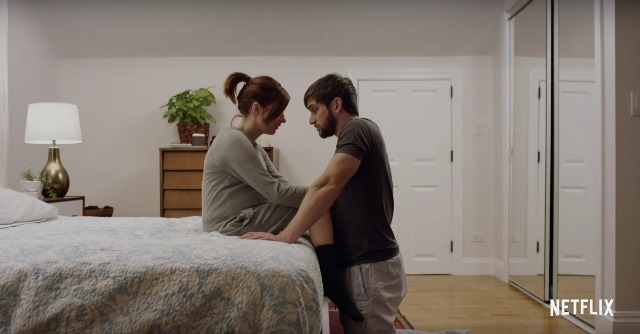More Than Local Novelty, 'Easy' Takes Sharp Look At Love & Adulthood
By Chicagoist_Guest in Arts & Entertainment on Sep 26, 2016 8:00PM

Aya Cash and Evan Jonigkeit in 'Easy' / Netflix
By Jacob Oller
Joe Swanberg's new Netflix anthology series about love, sex and day-to-day drama between people in Chicago, Easy, is eight episodes of sweet dysfunction. Not attempting to capture the city in anything but glimpses and in the personalities of its subjects, Easy’s Chicago follows different groups, mostly just past their quarter-life crises, caught between immaturity and responsibility.
There’s an exhilarating novelty in seeing Half Acre, Dark Matter, Wiggleworms or Davis Theatre; hearing characters discuss experimental filmmakers at a sparse Chicago Filmmakers screening; seeing Hannibal Buress work with the editor of Newcity; and watching Marc Maron take a potshot at the Chicago Reader, but the series’s best service to Chicago is highlighting the realm between fantasy and reality that houses many of its millennial residents.
Swanberg, known for his prolific burst of mumblecore millennial dramas (like 2013’s Drinking Buddies, whose brewery-focused drama echoes that of two episodes here), has made a career of these gaps in nuanced relationships over all genres of lo-fi indies. A graduate of Naperville Central High School and Southern Illinois University Carbondale, Swanberg’s filmography, including Easy, has maintained a Midwestern feel compared to the more eclectically-set films of his genre companions like the Duplass brothers.
Though each episode has little to do with the others besides the chance encounters between characters in each others’ episodes, Swanberg’s directorial style and favorite themes (couples that over- or under-share) permeate the series so that it feels like a four-hour movie with built-in bathroom breaks—a short film series that gives ample time for concessions.
These short films encapsulate romantic tensions that might never be discussed but are immediately recognizable and career problems that hit those with unfulfilling jobs (most of us) right in the gut. The series opens with one of Swanberg’s favorite topics, sex, and keeps it as a throughline.

(Netflix)
Inventively shot and lit sex scenes are Easy’s language: uncomfortable sex, routine sex, exciting sex. Orlando Bloom and Malin Akerman have a charmingly fitful threesome with Kate Micucci as a baby monitor’s responsibility calls them away from their carnal desires. Experimentation, infidelity and random hookups become instigating events rather than (pardon the pun) climaxes. They’re used to start conversations, shot as tightly as most of the opening shot/reverse-shots that introduce us to the characters. When the camera pulls back along with the narrative, we see the sex as something that fits into a larger relationship just as these characters fit within their community.
The casting—lots of locals and friendly faces—is spot on, creating a warm world where even if people don’t seem to know each other, they appear to exist in the same circle. Swanberg has a way with his actors that make each interaction feel realistic—the perfect acting where you never think of them as actors. Disagreements aren’t blowouts, they’re tense and uncomfortable wars of attrition. Lies stack when someone wants to impress their new partner or pretend not to be unfulfilled, but our emotional voyeurism cuts through. It’s hard not to follow with rapt attention, like when there’s a particularly juicy spat happening at the table next to yours at a restaurant. While all the episodes are slow burns, very few have moments of boredom.
“Controlada,” an episode almost entirely in Spanish, is rivetingly shot, with beautiful moments in Millennium Park and some jitteringly edited music that echoes a progressively drunken night out. Two middle episodes are the series weak points. “Art and Life,” featuring Marc Maron and Emily Ratajkowski as similar artists of different generations hits its hokey moral so hard you’d think it was reading it out loud in a free creative-writing workshop. “Chemistry Read,” though it ends with a divine overhead long take of a game of skittles, loses its focus and meanders too languidly—an odds-and-ends drawer of talented parts.
On first glance, that’s what the show seems to be about: weirdos and danglers-on, linked by nothing but a common city. But they’re all dreamers, pursuing aspirations of love, art or career. And whether it be a new job running an illegal brewery out of a garage (like Dave Franco, who delivers one of the best performances of the series) or the perfect threesome that somehow doesn’t ruin your marriage, the characters in Easy have to grapple with themselves and the real world for these dreams.
Often, reality comes to shut them down or at least make their victories bittersweet. But this Peter Pan mumblecore identifies the core of aging, hip, comfortable Chicagoans: how long do they—can they—strive for these, possibly fictitious, fantasies before cold reality tells them to get a real job and put a ring on that girlfriend of theirs who’s too good for them. We know these people, hell, we’ve been them ourselves. It’s both reassuring and troubling to see their stories of urbanite growth omnisciently, but completely worth it for anyone who once was or will be a Chicagoan.